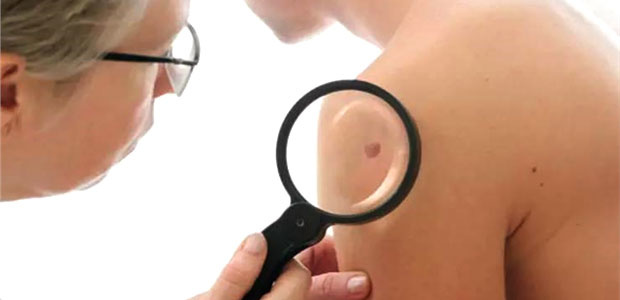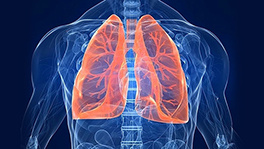
What is Skin Cancer?
The skin protects our body against heat, light, infection and injury. It also stores water, fat and vitamin D. It is made up of three distinct layers: the epidermis, the dermis and the hypodermis. Skin cancer is a disease in which cancer cells are found in the outer layers of the skin. Under normal circumstances, skin cells divide in an orderly manner to maintain tissue health. A cellular mass or tumor forms when growth control is lost. Most skin tumors are benign and are not likely to turn cancerous. However, if the tumor spreads to surrounding tissues or organs, it is considered malignant, or cancerous.
There are many types of skin cancers but the three most common ones are:
Basal cell carcinoma (60%) This is a slow-growing painless skin cancer. The cancer often presents as an indolent ulcer with a shiny or translucent raised margin. The ulcer is often pigmented. This cancer commonly appears on the face.
Squamous cell carcinoma (34%).This presents as a firm irregular fleshy growth, usually on sun-exposed skin. The growth can increase rapidly in size giving rise to a large lump, which may sometimes break down to form an ulcer. If untreated, the cancer may spread to the surrounding lymph glands. Squamous cell carcinoma usually appears in elderly patients. Chronic sun exposure is an important contributing factor in the development of this skin cancer.
Malignant melanoma (4%) This is a cancer of the pigment cells of the skin. It is a highly malignant skin cancer. It presents as a dark brown or dark skin growth or ulcer. It may look like an ordinary mole. But unlike the common mole
– it grows rapidly
– it has an irregular margin
– it tends to be large
– it tends to be thick
– its surface has several shades of red, black or blue colors.
It occurs on fingers, toes and face.
What are the signs and symptoms?
Skin cancer takes a variety of forms. It is seldom painful and may not manifest itself as an ugly lesion. If there is any unusual growth on the skin that does not go away within a couple of weeks, seek medical attention.
The "ABCDE" rule can help you to look out for signs of Skin Cancer:
Asymmetry: When both sides of mole do not look the same.
Border: The edges of a mole are blurry or jagged.
Colour The colour of a mole changes; if it becomes darker than before, or if the colour spreads or goes away, or if more than one colour appears (blue, red, white, pink, purple or grey).
Diameter When a mole is larger than a quarter of an inch in diameter (about the size of a pencil eraser).
Elevation When a mole is raised above the skin and has a rough surface.
You should also watch for these changes to your skin:
A mole that bleeds
A mole that grows fast
A scaly or crusted growth on the skin
A sore that won’t hea
A mole that itches
A spot on your skin that feels rough like sandpaper
Are you at risk?
Common skin cancer seems to be related to a slow build- up of the effects of exposure to the sun’s ultraviolet rays over many years. Although anyone can get skin cancer, people with certain characteristics are particularly at risk. These include:
Fair to light-skinned people who do not tan but go red in sun
People with red hair & blue eyes
Family history of skin cancer
Personal history of skin cancer
Chronic exposure to the sun
History of sunburn early in life
People with atypical moles
People with freckles and/or a large number of moles
The risk may also increase if one is on certain drugs, or under ultraviolet therapy, or exposed to certain industrial chemicals.
How to prevent?
Exposure to the sun’s ultraviolet (UV) rays appears to be the most important factor in the development of skin cancer. Skin cancer is largely preventable when sun protection measures are consistently used. Follow these "safe-sun" guidelines whenever you are in the sun:
Reduce sun exposure, if you can, especially from 10am to 4pm when the sun’s UV ray are the most intense or when the UV index is 3 or more.
Wear a long-sleeved shirt and long pants to protect the skin. Loose-fitting and cotton clothing are cooler.
Wear sunglasses to protect your eyes from the sun. Sun exposure increases your risk of getting cataracts.
Wear a wide-brimmed hat. Wide-brimmed hats help protect your face, neck and ears from the sun.
Use a sunscreen with a sun protection factor (SPF) of at least 15 daily, even on cloudy days.
Remember about reflection: Water, sand, snow and concrete can reflect up to 80% of the sun’s damaging rays.
Avoid tanning salons and sunlamps: These lights emit mostly UVA radiation – up to 2 – 5 times as much as natural sunlight. UVA radiation cause sunburn, premature aging of the skin and skin cancer.
How is Skin Cancer treated?
All skin cancers should be removed immediately. The cancerous tumours must be destroyed or removed surgically. Sometimes, a small piece of tumour is removed first (skin biopsy) for examination to confirm if it is cancerous. The treatment method will depend on age, general health, the type and size of the cancer, site on the body, personal preference and whether the cancer has spread to other parts of the body. For a large cancer, a skin graft may be necessary. This involves using a layer of the skin from another part of the body. If the cancer is very small and not deep, it may be removed by freezing it. When one is medically unfit for surgery or where surgery might be difficult or disfiguring, radiotherapy may be used. In the case of chemotherapy, the drugs may come in the form of a cream or liquid to be applied directly to the tumour, or as a tablet.


 (MY)+60 10-898 8919
(MY)+60 10-898 8919


























 Leave
Leave